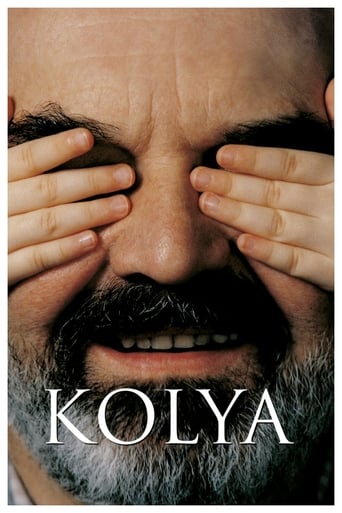gavin6942
Franta Louka (Sean Connery) is a concert cellist in Soviet-occupied Czechoslovakia, a confirmed bachelor and a lady's man. Having lost his place in the state orchestra, he must make ends meet by playing at funerals and painting tombstones.Although I am by no means well-versed in Czech film, I have seen a few of the New Wave pieces and have been impressed. Here, we see a much more modern, realistic approach. If the characters spoke English, this could have passed for an independent 1990s American film. (Maybe it is just my bias, but I tend to think the 90s were the best decade for indie film, second to none except maybe the 1970s.) The Velvet Revolution or Gentle Revolution was a non-violent transition of power in what was then Czechoslovakia. The period of upheaval and transition took place from November 17 to December 29, 1989. Do Americans know about this? No, because we are rather ignorant of European affairs (which may or may not be a bad thing). Setting the film in this time creates an interesting dynamic, because Czechoslovakia has a nice distinction of being between the Western world and the Russian world (yes, Russia is part of Europe, but only in the most literal sense).
jackbenimble
Koyla started out full of promise and had my full attention in the beginning. There's a fair bit of suspense and fun as we try to work out who our man is and how his womanising is going to turn out. There's a fair bit of humour and nice cinematography and you get a nice feel for the country. But then after Kolya the boy turns up it starts to get a bit slushy. There are some nice tender moments but for me it all got too much and you need some drama to balance that out. Only when our man is being interrogated do we get any further suspense. But from then on it's just more of the same, nice filming, child caring and 'sweet' moments but it all got too much for me after a while and I began tuning out. The main actor didn't really express much range of emotion either and he and the film just began to come off as a bit one dimensional as the film dragged to its predictable conclusion.
le_dutz
This movie is simply great and deserved the award. Yes, it uses quite a lot of the "established machinery" of the romantic movie industry. Two strangers come together, and there will develop some sort of positive relationship, because at last we all humans. But this time the strangers are a mature Czech and a fragile Russian kid. Russian means one of those, that years before crossed the border with tanks. And stayed with their tanks. So Louka would rather like to keep a distance. But the plot doesn't allow him so. To me the movie is about historical understanding and forgiveness, described on the level of individual human relations. I haven't seen this kind of movies before.Well, may be I'm simply wrong.
Jugu Abraham
I am neither Czech nor European. I grew up appreciating the fine Czech cinema of Milos Forman, Jan Kadar and Jiri Menzel. While "Kolya" is refreshing compared to American standards, it lacks the maturity of say Kadar's "Lies my father told me" (Golden Globe winner for best foreign film in 1976) made in Canada—a film in English with a Czech heart and soul or Forman's "Loves of a blonde" (also about music and musicians).Czech cinema gives a lot of importance to classical Western music. In "Kolya," the emphasis is on Dvorak's Biblical songs—"The Lord is my shepherd" being one. The film might not appear to be religious but interestingly many of Czech filmmakers seem to use religion without making it obvious. (In neighboring Poland, Kieslowski loved to do this to the extent that he made a series of 10 films called "Dekalog" linked to the Ten Commandments.) In the film the child inexplicably swears "Jesus Christ" in Russian. The underlying analogy of a child redeeming the life of wayward adults with no purpose in life is not a surprising turn for east European directors who couch religion in non-religious ambiance. Is it a coincidence that church steeples are visible from the windows and crosses are drawn by a child? As a film, this is at best a good Czech film--nothing more. There have been better Czech films unknown to American and West European audiences.



